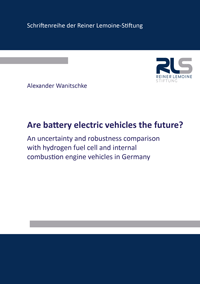
Shop : Details
Shop
Details
48,80 €ISBN 978-3-8440-8224-1Softcover166 pages41 figures246 g21 x 14,8 cmEnglishThesis
September 2021
Alexander Wanitschke
Are battery electric vehicles the future?
An uncertainty and robustness comparison with hydrogen fuel cell and internal combustion engine vehicles in Germany
The passenger vehicle sector in Germany is under increasing pressure to reduce its greenhouse gas emissions. Three distinct technology options are available as a scalable remedy: (1) internal combustion engine vehicles (ICEV) supplied with non-fossil, hydrocarbon fuels, (2) fuel cell electric vehicles (FCEV) supplied with hydrogen, and (3) battery electric vehicles (BEV) supplied with electric energy. Public disagreement about the “best” option persist to this day. While uncertainty (i.e., lack of knowledge) arguably plays a major role in this disagreement, past research has touched only superficially on what we do and do not know in order to assess how robust the feasibility of any of the technology options is with regards to possible future states of the world.
In order to address this issue I conducted both a systematic uncertainty analysis and a consecutive robustness analysis. The results show that even though all three drive technology options are affected by a similar number and quality of uncertainties, the uncertainty landscape translates into significant differences of robustness regarding the different vehicle technologies' total cost of ownership (TCO) and life cycle greenhouse gas emissions (LCE). According to a tipping point analysis none of the three technologies can be demonstrated to reliably outperform their competitors in all conceivable future states of the world. Each of the three technologies still has distinct vulnerabilities and associated risks. However, it can be argued that today’s reality is closer to the point of clear superiority for BEV than for FCEV or ICEV. Overall my research contributes further arguments of why BEVs should be considered the most reliable option for decarbonizing passenger vehicles in Germany.
In order to address this issue I conducted both a systematic uncertainty analysis and a consecutive robustness analysis. The results show that even though all three drive technology options are affected by a similar number and quality of uncertainties, the uncertainty landscape translates into significant differences of robustness regarding the different vehicle technologies' total cost of ownership (TCO) and life cycle greenhouse gas emissions (LCE). According to a tipping point analysis none of the three technologies can be demonstrated to reliably outperform their competitors in all conceivable future states of the world. Each of the three technologies still has distinct vulnerabilities and associated risks. However, it can be argued that today’s reality is closer to the point of clear superiority for BEV than for FCEV or ICEV. Overall my research contributes further arguments of why BEVs should be considered the most reliable option for decarbonizing passenger vehicles in Germany.
Keywords: Elektromobilität; Energiewende im Verkehr; Verkehrswende; Wasserstoff; synthetische Kraftstoffe
Schriftenreihe der Reiner Lemoine-Stiftung
Edited by Reiner Lemoine-Stiftung, Neuss
Available online documents for this title
DOI 10.2370/9783844082241
You need Adobe Reader, to view these files. Here you will find a little help and information for downloading the PDF files.
Please note that the online documents cannot be printed or edited.
Please also see further information at: Help and Information.
Please also see further information at: Help and Information.
| Document |  | Document | ||
| Type |  | |||
| Costs |  | 36,60 € | ||
| Action |  | Purchase in obligation and download the file | ||
| Document |  | Table of contents | ||
| Type |  | |||
| Costs |  | free | ||
| Action |  | Download the file | ||
User settings for registered online customers (online documents)
You can change your address details here and access documents you have already ordered.
User
Not logged in
Export of bibliographic data
Shaker Verlag GmbH
Am Langen Graben 15a
52353 Düren
Germany
Am Langen Graben 15a
52353 Düren
Germany
Mon. - Thurs. 8:00 a.m. to 4:00 p.m.
Fri. 8:00 a.m. to 3:00 p.m.
Fri. 8:00 a.m. to 3:00 p.m.
Contact us. We will be happy to help you.



